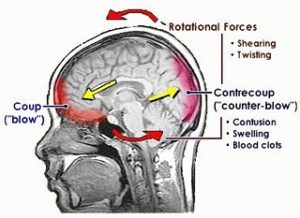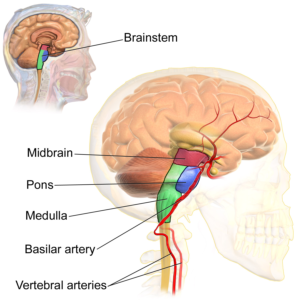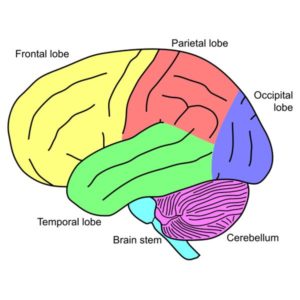Concusssion/TBI Program

As you watch the short video above of the brain smashing against the skull, the wave-like movements extend deep into the brain wreaking havoc on the deep nuclei of the brain and the brainstem, where all of your vital areas reside.
Most people think of headaches and dizziness and pain with concussions, but never think about blood pressure and heart rate changes, the importance of blood sugar stability and maintaining proper essential fatty acid intake during the acute phase, but let us tell you, there are MANY things to consider in addition to the head, spine, and the muscles controlling them.
The first thing that happens in concussion, is that neurons are stretched, twisted, and injured at the areas of contact, and deep within the brain. The biggest problem with injuries deep within the brain, is that the brain stem is injured and it houses long tracts that connect different parts of the brain, and the following list is the symptoms that can occur when the brain stem is injured in a concussion:
- Heart rate variability
- Develop poor gut function
- Leaky gut
- dysbiosis

- constipation/diarrhea
- Dry eyes and dry mouth
- Balance issues
- Coordination issues
- Fatigue
- Sound Sensitivity
- Light Sensitivity
- Tinnitus or ringing in the ears
- Double vision
- Vision problems
- Lightheaded
When you have Cortical injury or the areas of the cerebral cortex are injured (Frontal Lobe, Parietal Lobe, Temporal Lobe, Basal Ganglia), you often experience the following symptoms:
- Trouble focusing
- Attention issues

- Motivation Problems
- Depression and Anxiety
- Behavioral Problems
- Fatigue when reading
- Unprovoked anger
- Apathy or not caring
- Increased or decreased skin sensitivity issues
- Dyslexia
- Speech issues
- Memory issues
- Spatial awareness issues
- Poor Balance
Injury to the Cerebellum is a bad thing, but a very common occurrence in concussions. The cerebellum is called “the little brain” because it actually has more neurons than the entire brain itself. The cerebellum is involved in every aspect of information that comes into, or leaves the brain. It controls the following:
- muscle tone
- motor coordination
- thoughts

- emotions
- balance
- controls vestibular output
- controls posture
- responsible for dizziness
- Integrates all parts of the brain constantly
Our diagnostic testing helps to determine which parts of the brain are involved, and to what extent.
Our physical examination helps determine how well your brain is being fueled, and how hard we can push you to rehab.
If you have concerns about any of these areas of your brain, please be sure to contact us.

